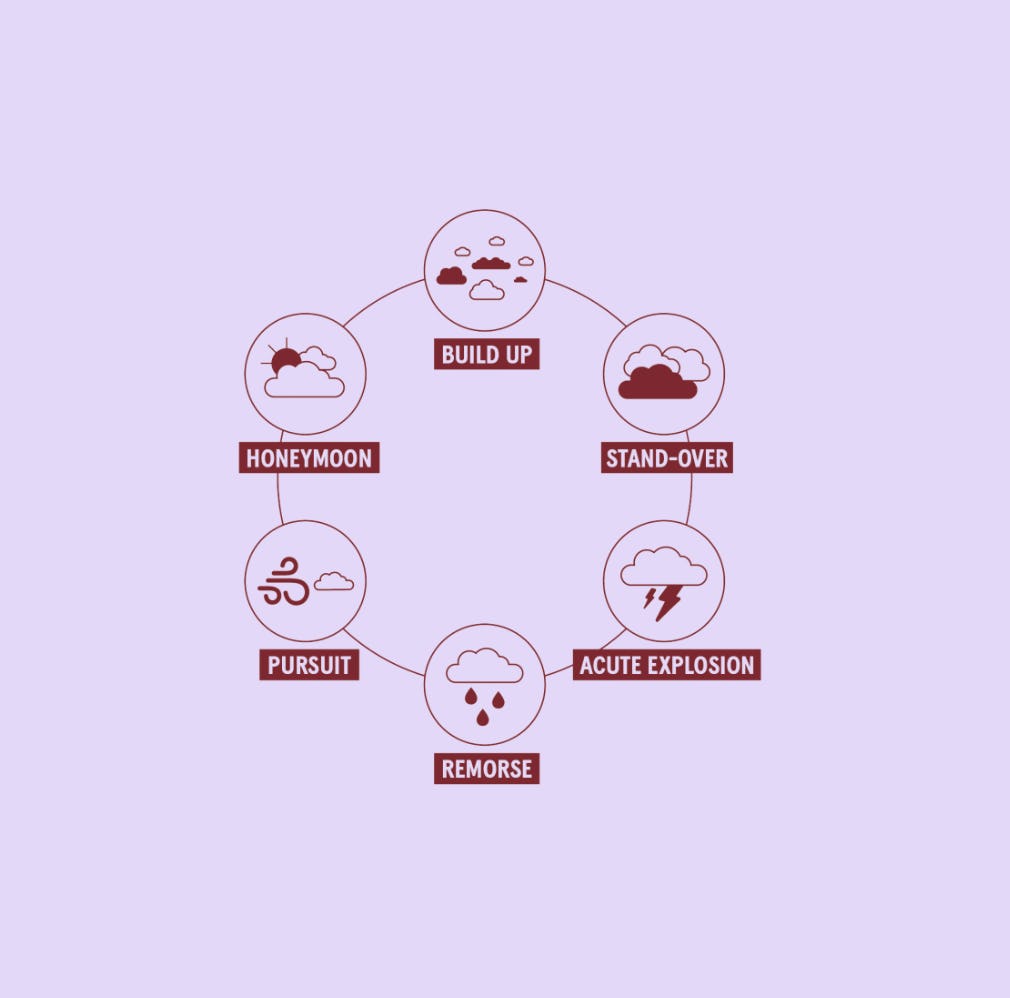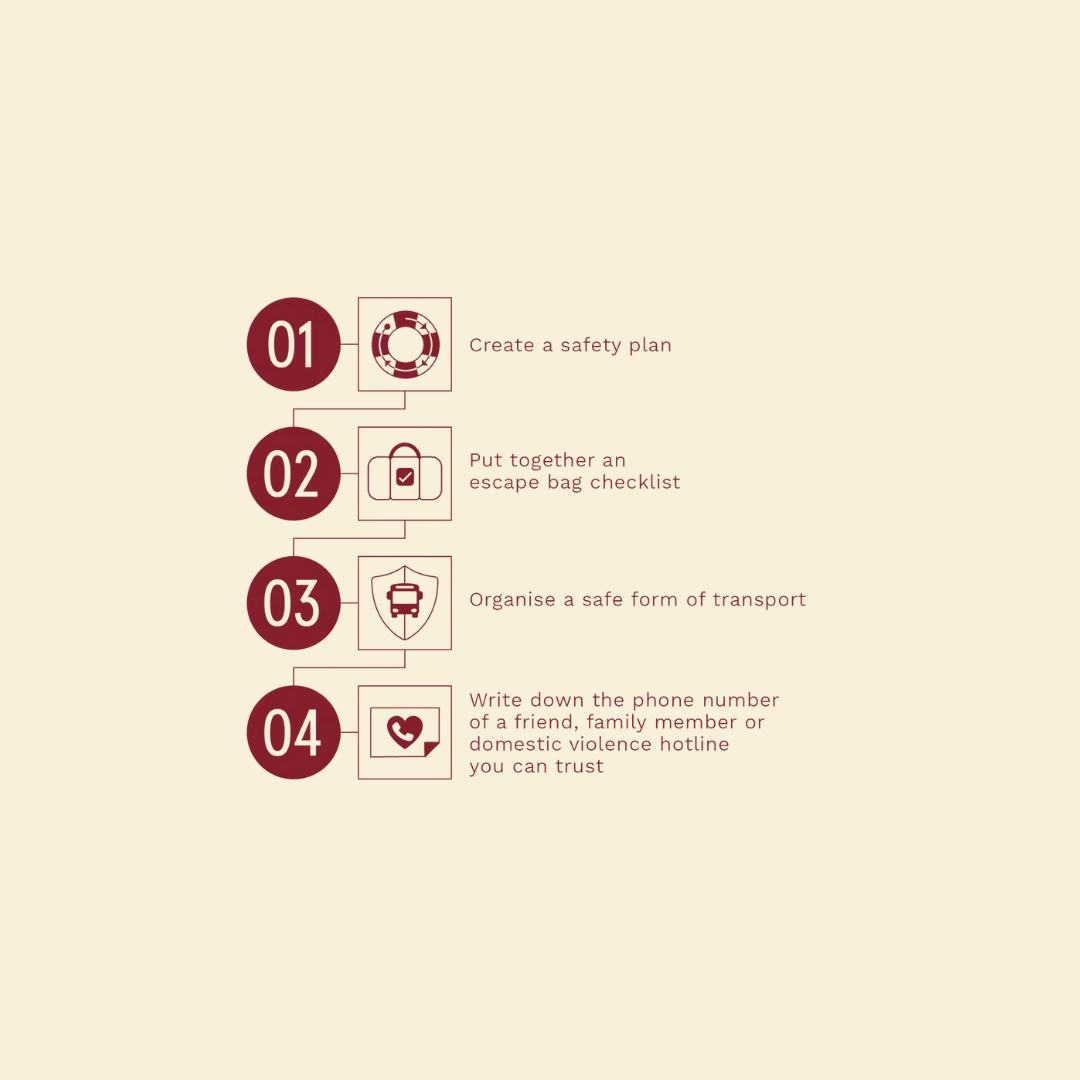Safety planning and the cycle of violence
If you need domestic and family violence support, call 1800RESPECT (1800 737 732). If you are in physical danger, please call the police on Triple Zero (000).
What is the cycle of violence?
The cycle of violence explains how and why the behaviour of a person who commits domestic and family violence may change so dramatically over time. The cycle goes through a number of stages and provides an understanding as to why you or the person you are supporting might experience warning signs only sometimes during the day, week or month.
The cycle is not the same for everyone and some people may experience only some stages of the cycle or not relate to it at all. Please remember that the cycle is only a reference. If your experiences do not match this cycle, it does not mean that your experience of domestic or family violence is not to be considered just as seriously.
Have you thought about leaving the relationship or home?
If you have thought about leaving the relationship or home, here are some steps that will help keep you safe.
Create a Safety Plan
• Plan an escape route from every room in your home
• Think of safe area at home to go to if argument starts (away from weapons, hard surfaces and close to exits)
• Plan and practice the quickest way to leave the house
• Create and keep your escape bag close by but out of sight from perpetrator
• If possible, plan a safe time to exit the property
• Think about and make a list of safe people to contact, if possible memorise important numbers
• ALWAYS try to take your children with you or make arrangements to leave them with someone safe
• Create a CODE WORD or SIGN so your children/ neighbours or family know when to call the police for help
• If you have any mobility issues or disability arrange in advance for a friend or other support person to come straight away if you ring or text them
• Teach your children how to call the police: Dial 000 > Say address > Say name > Say “Help, mum is hurt”
Put together an Escape Bag Checklist
Essentials
• House and car keys
• ID: you and children
• Mobile phone and charger
• Change of clothes
• Medication
• Children’s favourite toy/blanket
• Baby equipment including bottles and nappies
Identification
• Your Passport and Birth Certificate
• Children’s passport and Birth Certificate
• Drivers License
Financial
• Money including cash, credit or debit card
• Bank details
Legal Papers
• ADVO (always have a copy on you in your purse)
• Tenancy agreement, lease, rental agreement or house deed
• Car registration and insurance papers
• Marriage Certificate and/or Divorce papers
• Custody Papers
Organise a Safe Form of Transport
• If you don’t have a car make sure arranged transport with a friend or public transport
• Remember you can call police to pick you up to take you to a safe place if you feel in immediate or potential danger
• Park close to your building for work and home and consider asking someone to accompany you to and from the car
• Only leave your home and work place when it is safe to do so
• If possible, park your car on the street instead of in the driveway so you cannot be blocked in
• Practice travelling to the location you have chosen as the safe place, such as a trusted family or friend or crisis accommodation
• After leaving the relationship, start changing your normal routine (catch different trains or buses, leave home or work at different hours, and shop in different places)
• If possible save some money in case you need to take emergency transportation to a safe place
Write down phone numbers of:
• Trusted family member
• Friend
• 1800 RESPECT (1800 737 732)
WHAT ARE YOUR OPTIONS AFTER LEAVING A VIOLENT SITUATION?
After making the brave decision to leave your home due to domestic and/or family violence, you need to continue to ensure you and your children’s safety. You can do this by:
• Accessing crisis accommodation
• Accessing temporary accommodation
• Staying at a family or friends
When you arrive:
• Keep ALL addresses of your accommodation confidential; don’t tell anyone your location, not even mutual friends or family members of the perpetrator, in case the perpetrator locates you
• Inform the police you are safe and to let your trusted family know you are safe however the less your family know of your location the safer they will be if your partner asks them
• Talk to a DFV service, community lawyer or the police about getting an apprehended domestic violence order (ADVO) if you don’t already have one
• After leaving start changing your normal routine, such as, catching different trains or buses, leaving home or work at different hours and shopping in different places
• If you need to have contact with the perpetrator use email only, it is an easier way to keep a record of your conversations
• If you see the perpetrator get into a public space or busy place as soon as possible
• You are not under any legal obligation to inform your partner of your children’s whereabouts unless there are family law court orders in place – seek legal advice as soon as possible around disclosing your child’s current location
• Turn off the GPS location settings on your phone
• Get a Po Box for important mail, if the perpetrator has or could get access to your home letterbox
• Stay away from ALL social media as much as possible. Perpetrators can check your location via social media
• Change your mobile number to prepaid so it is untraceable
• Change all passwords: emails, banking, and social media for anything your partner may know the passwords to
• Get a new travel opal card that is untraceable and prepaid
• If speaking to support services, ensure you ask your address to be confidential
If you choose to stay in your home:
• Tell trusted friends or relatives that you are no longer in the relationship and they should call the police if they see your former partner near or trying to gain access to your home
• Change the locks on your doors, make sure all windows are as secure as possible
• Have additional security installed- sensor lighting/ burglar alarm
• Change the routes you usually take your children to school
• Inform people who look after your children EG. Teachers, childcare, which people have permission to collect them. If you have an ADVO, give a copy to the school
• Change your phone number
• When at work ask someone to screen your calls, it may be a good idea to speak to a trusted supervisor/ senior to inform them of your current difficulties/ risks. It is up to you how much or how little you advise the supervisor at work of your current circumstances (if you chose to at all). We suggest this as it may mean your employer is more flexible with your start and finish time, which enhances aspects of your safety plan, which you can discuss with your case manager
• Change your routes within your standard weekly schedule EG. Shop in a different supermarket at different times and take a different route home


